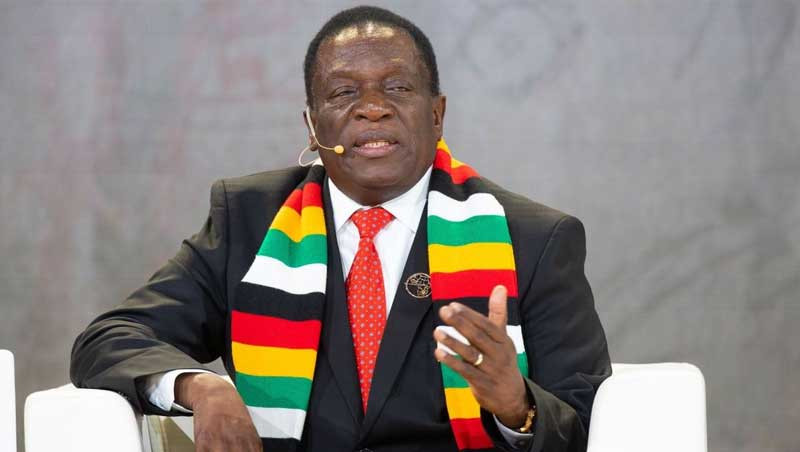
PRESIDENT Emmerson Mnangagwa has refused to respond to allegations by former judge Justice Erica Ndewere accusing him of using unlawful recommendations of a tribunal to remove her from office.
In his response, Mnangagwa said the Chief Justice and Judicial Services Commission (JSC) must go to the Constitutional Court to answer for themselves.
Ndewere approached the Constitutional Court in her last bid to get her job back three years after she was dismissed from the bench by Mnangagwa for alleged gross misconduct.
Ndewere denied the allegations and is seeking the intervention of the highest court on grounds of discrimination.
The former judge, who is being represented by Beatrice Mtetwa, filed a 2 000-page document claiming that her fundamental rights were infringed and is seeking the highest court in the land to reinstate her without loss of salary and benefits.
Ndewere claims that she was discriminated against by JSC and Mnangagwa when she was not treated equally before the law, with other judges in similar circumstances.
However, Mnangagwa insisted that he played his role according to the Constitution.
“The applicant contends that the recommendations of the tribunal to the respondent are unlawful and invalid. In support of that contention the applicant's founding affidavit is replete with allegations against the Chief Justice, the JSC and the tribunal but none have been made party to these proceedings. Respondent cannot vouch for them.”
- ‘Govt spineless on wetland land barons’
- SA’s search for a fairer electoral system
- SA’s search for a fairer electoral system
- Mawere demands judge’s recusal
Keep Reading
Ndewere argues that she filed her application in terms of Section 167(2)d of the Constitution in which only the President is cited for failing to fulfil his constitutional duty.
She said the Constitution allowed only the President and Parliament to be permissible respondents according to this section and that since the President received the full report from the tribunal, he must be able to defend the unlawful basis on which she was removed.
Ndewere is asking the Constitutional Court to set aside the findings of the Tribunal and re-instate her to her position as a High Court judge.
She is also claiming that she was discriminated against in the way she was treated and is claiming the right to equality and non-discrimination and for JSC to treat her in the same way as her similarly affected colleagues in terms of disciplinary processes and access to salary and benefits.
She argues that it is accepted practice for all judges at the High Court, Supreme Court and Constitutional Court to exceed the 90-day period stipulated in SI 107/12 because of different circumstances of each case.
Ndewere submitted that it becomes discriminatory and unlawful where she is singled out for punishment, out of 17 other judges that were identified by the Chief Justice in his several memoranda to the Judge President, that their judgments were in arrears, but the 17 judges were not brought before the tribunal for similar offences.
Ndewere also cited as discriminatory, the process of disciplinary hearing that was used against her because male judges who were charged for gross misconduct, that is Justice Francis Bere, Justice Tompson Mabhikwa and Justice Martin Makonese were allowed to be heard by a panel of judges as required by Statutory Instrument 107/12 before being referred to the tribunal, saying she was denied the same opportunity to be heard because she believed that the Chief Justice had an axe to grind with her.
Mnangagwa, however, said had he acted contrary to the recommendations of the tribunal, he would have failed to fulfil his constitutional obligation.
“Section 90 of the Constitution requires the 1st respondent to uphold, defend, obey and respect the Constitution. Section 187(8) does not permit the respondent to act contrary to the recommendations of the tribunal and make a decision which he deems appropriate.
“The applicant contends that the recommendations of the tribunal to the respondent (President) were unlawful and invalid. In support of that contention the applicant's founding affidavit is replete with allegations against the Chief Justice, the Judicial Service Commission and the tribunal.
“None of whom have been made a party to these proceedings. None of them has been afforded an opportunity to respond to the allegations. The respondent cannot vouch for them. Applicant has maligned the office of the Chief Justice, the Judicial Service Commission and members of the tribunal without affording them an opportunity to respond and thereby breaching the audi alteram partem rule.
“The application must, therefore, be struck out on the basis of non-joinder of the persons mentioned in the preceding paragraph whose response is essential in establishing the veracity of the allegations made by the applicant,” Mnangagwa submitted.
The matter is pending.










